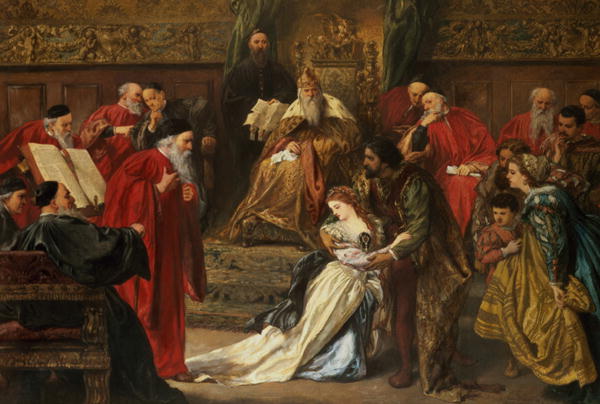In the end of King Lear, Edgar speaks this line:
The conflicts in the play, both in Lear's family and Gloucester's start when people don't say what they mean and don't mean what they say. Although it's clear that Regan and Goneril are the guiltiest party, Cordelia is not free from fault. What strikes me from Cordelia's choice of words is that it sounds so cold. Too cold.
What Cordelia underlines in her speech is her duty as a daughter, but she doesn't express how she views that duty - whether she willingly does it out of love, or just out of obligation. It sounds more like something a daughter "ought to say". She's not honest either to her father or herself.
The other person who doesn't say what he feels is Gloucester. We can sense that he loves Edmund. He just cannot express it properly. Instead of saying that he loves Edmund although he's a bastard right away, he deliberately chooses pejorative and rude words to describe him. Well, that's what he "ought to say", because in his society, people don't appreciate illegitimate children.
Those eyes of his must pay the price.
I really think that being able to express one's feeling without holding back, especially expressing positive feelings such as love and respect, is one of the greatest joys in life. Why should we hide such feelings?
"Speak what we feel, not what we ought to say."Simple as it may sound, I believe it is a perfect conclusion to all the things that have happened in the play.
The conflicts in the play, both in Lear's family and Gloucester's start when people don't say what they mean and don't mean what they say. Although it's clear that Regan and Goneril are the guiltiest party, Cordelia is not free from fault. What strikes me from Cordelia's choice of words is that it sounds so cold. Too cold.
"You have begot me, bred me, loved me: IReturn those duties back as are right fit,Obey you, love you, and most honour you."These words certainly wouldn't appeal any parent.
 |
| Cordelia in the Court of King Lear by Sir John Gilbert |
What Cordelia underlines in her speech is her duty as a daughter, but she doesn't express how she views that duty - whether she willingly does it out of love, or just out of obligation. It sounds more like something a daughter "ought to say". She's not honest either to her father or herself.
The other person who doesn't say what he feels is Gloucester. We can sense that he loves Edmund. He just cannot express it properly. Instead of saying that he loves Edmund although he's a bastard right away, he deliberately chooses pejorative and rude words to describe him. Well, that's what he "ought to say", because in his society, people don't appreciate illegitimate children.
Those eyes of his must pay the price.
I really think that being able to express one's feeling without holding back, especially expressing positive feelings such as love and respect, is one of the greatest joys in life. Why should we hide such feelings?
Comments
Post a Comment